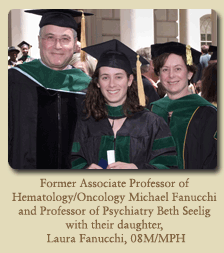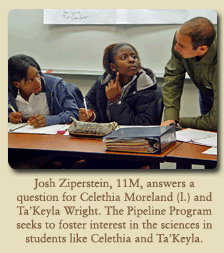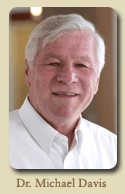



June 2008
Notes from Commencement
The Class of 2008 leave s behind a legacy like few other classes before them. Class members campaigned successfully to help save Grady Hospital through the student organization HealthSTAT.
“Most medical students’ parents dream of the day their daughter or son calls and says, `I helped save a life today.’ This class did more than that,” said Arthur Kellermann, commencement speaker and Associate Dean for Health Policy. “Working in concert with other medical students, public health students, nursing students, residents, and undergraduates at Emory, Morehouse, Medical College of Georgia, Mercer, and other Georgia campuses, they helped save the life of a 953-bed public hospital.
Emory, Morehouse, Medical College of Georgia, Mercer, and other Georgia campuses, they helped save the life of a 953-bed public hospital.
“When Grady’s future was on the line this year, these men and women didn’t hide behind their stethoscopes,” he added. “They fought for the hospital. And they won.”
Graduates received other accolades as well. Of the 112 graduates, six students received MD/PhD degrees, and 15 received MD/MPH degrees. Twelve students graduated cum laude, four magna cum laude, and three summa cum laude. Prior to commencement, B. Hunter Butler received the Evangeline T. Papageorge Outstanding Student Award, Larissa Thomas received the Bolton Service Award, and Kate Neuhausen received the Schear Book Award.
Students chose Joel Felner, Associate Dean for Clinical Education, as their honorary class member. They also gave two standing ovations to William Eley, Executive Associate Dean for Medical Education and Student Affairs, who received both the Evangeline T. Papageorge Distinguished Faculty Award and the Emory Williams Teaching Award during the diploma ceremony. “Students have made it a professional goal to emulate Dr. Eley’s devotion to patients,” said Medical Alumni Association President Maxwell White in announcing the Papageorge Award.
TOP
The next stage
Along with our farewells to the Class of 2008 come our good wishes for the next stage of their medical careers: residency. Of the 112 graduating students, 108 participated in the National Residency Match Program. Nineteen will spend all or part of their residencies at Emory, joining 177 students from other medical schools.
Those 193 incoming first-year residents make up a full contingent. Although I thought the financial difficulties at Grady Hospital might leave some questions for medical students who, last year, were making their residency choices, I’m happy to say that the number and quality of applications remained the same as in past years. The quality and breadth of our program at Grady always has attracted the brightest minds in medicine, and this year is no different.
My letter to residency candidates in January detailed the many positive changes ahead for Grady. Grady has a new nonprofit managing corporation and board. A new hospital CEO is expected to be named this month. Governor Sonny Perdue has called for a statewide trauma network and a future budget of $53 million in state funding to jump-start the network. He also is increasing the rate of Medicaid reimbursement to state trauma centers. All of these moves together will make a stronger, better managed, and more financially stable hospital than before.
TOP
Tipping the domino
The 10th graders were on the lookout for the culprit, a dastardly pathogen responsible for an outbreak of gastrointestinal illness. One by one, the clues fell into place. The high-schoolers, under the mentorship of our medical students, looked up epidemiologic terms, sorted data, and calculated incubation times, all of which helped solve the mystery: Staphylococcus aureus endotoxin.
helped solve the mystery: Staphylococcus aureus endotoxin.
Some of these medical detectives from South Atlanta School of Health and Medical Sciences may be future doctors or scientists, thanks to the Pipeline Program, founded by two of our students, Samuel Funt, 10M, and Zwane Marshall, 05C, 10M.
“After three months of first-year classes,” says Funt, who participated in a similar program as an undergraduate at the University of Pennsylvania, “it became clear to me that I had many years to go before I would be able to really help people in a clinical setting.”
So he and Marshall decided they could make a difference now by helping foster interest in the sciences among underprivileged high-schoolers. With the help of Robert Lee (Associate Dean, Multicultural Student Affairs), Funt and Marshall established a relationship with South Atlanta School of Health and Medical Sciences, a division of South Atlanta High School, and recruited medical students as mentors for the program. (South Atlanta High sits in a district where more than 90% of its residents live below the federal poverty line.) The mentors set up case studies (this time on food poisoning and HIV), helped the teens develop a final research project, and provided advice on college and career goals.
The sophomores’ enthusiasm for the program has had a domino effect. After the HIV case study, a number of the sophomores decided to work at Grady Hospital’s teen clinic. The 26 students in the program improved their average daily school attendance by 26%, reports principal Termerion McCrary. During the middle of the first semester, 39% of the students were failing at least one course. By spring, nearly 87% of the pipeline students were passing all their courses.
TOP
Focus on hematology and medical oncology
The SOM has established a new Department of Hematology and Medical Oncology and named Dr. Fadlo Khuri as the Roberto Goizueta Chair for Cancer Research. “There are only nine formal departments of this type in the country, so the move gives us elite status nationally,” says Dr. Khuri. “In five years, our faculty size has more than quadrupled, and our federal funding has grown from $1 to $10 million a year.” Other recent accomplishments in the department include the following:
• |
Drs. Jing Chen (Assistant Professor) and Sumin Kang (postdoctoral fellow) are the first to discover a mechanism that plays a critical role in the multiple myeloma cell cycle and survival. Their research, published in the journal Cancer Cell, identifies a new therapeutic target for treating multiple myeloma, which is among the most common hematologic malignancies in patients over 65. |
• |
Dr. Sagar Lonial (Associate Professor), who received the Multiple Myeloma Research Consortium Center of the Year Award late last year, and Dr. John Kauh (Assistant Professor) both have initiated promising first-ever human trials of a NEDD-1 inhibitor for hematologic cancers and solid tumors, respectively. |
• |
Dr. Dong Moon Shin (Professor) is the principal investigator of the NCI-funded Specialized Research Project of Excellence (SPORE) grant in head and neck, which was selected by the NCI as an exemplar program. “This is a remarkable national recognition because our program is still very young,” Shin says. “We found that the anti-tumor mechanisms of a natural compound of green tea work synergistically with an EGFR-targeted agent, erkotinib, in preclinical models.” |
• |
Dr. Ruth O’Regan (Assistant Professor) has begun the state’s first integrated cancer clinical trial for early stage breast cancer patients. It is the first study of its kind in Georgia in which an investigator from an academic medical facility will collaborate with community-based oncologists. |
• |
Dr. Suresh Ramalingam (Associate Professor) joined the department last October. This nationally known researcher broadens the department’s focus on developing novel anti-cancer therapies for lung and esophageal cancers and other thoracic cancers. |
TOP
Awards and Honors
 James Lah (Neurology) will receive the Tomorrow’s Leader in Alzheimer’s Disease Research Award in July to recognize his research on understanding disease-causing mechanisms to improve the care of people with neurodegenerative disorders.
James Lah (Neurology) will receive the Tomorrow’s Leader in Alzheimer’s Disease Research Award in July to recognize his research on understanding disease-causing mechanisms to improve the care of people with neurodegenerative disorders.
The award, which comes with a $100,000 prize, is from the Alzheimer’s Association, Cure Alzheimer’s Fund, and the Lou Ruvo Brain Institute. The three institutions created the award in memory of two Alzheimer’s research pioneers from the NIH, George Glenner and Leon Thal.
Lah currently is the clinical core leader of the Alzheimer’s Disease Research Center.
 Michael Davis (Psychiatry and Behavioral Sciences/Yerkes) recently received the 2008 Edward Scolnick Prize in Neuroscience from the McGovern Institute for Brain Research for his work on the neural basis of fear.
Michael Davis (Psychiatry and Behavioral Sciences/Yerkes) recently received the 2008 Edward Scolnick Prize in Neuroscience from the McGovern Institute for Brain Research for his work on the neural basis of fear.
Kathryn Hall-Boyer (Emergency Medicine) has received the Hero of Emergency Medicine recognition from the American College of Emergency Physicians (ACEP) for her contributions to the field and in her various roles with the U.S. Armed Services. She currently serves as a battalion commander in medical training support in the Army Reserves at Fort Gordon. She also chairs the American Association of Women Emergency Physicians section of ACEP.
Thomas J. Lawley, MD
Dean, Emory School of Medicine
TOP
Current Issue • Past Issues • SOM Home
Contact Us • Give a Gift
Copyright © Emory University, 2008. All Rights Reserved